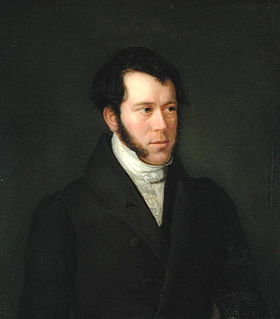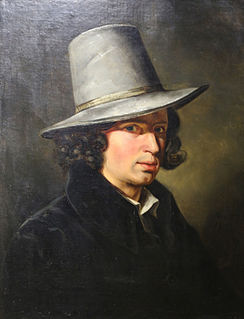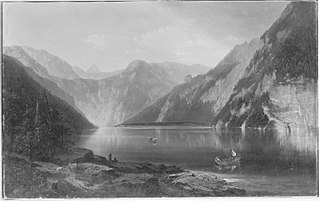
Carl Joseph Begas, or Karl Begas, was a German painter who played an important role in the transition from Romanticism to Realism. He was the first in a multi-generational "dynasty" of artists.

Friedrich Preller the Elder was a German landscape painter and etcher. From 1832 he was a professor at the Fürstlichen freien Zeichenschule in Weimar. He was the father of the artist Friedrich Preller the Younger.

Pascha Johann Friedrich Weitsch was a German landscape painter and illustrator. His unusual first name was not a nickname derived from the Turkish word "Pasha", as is often stated. It came from his godfather, Pasche Wipperling, and was an abbreviation of "Paschalis".

Johann Leonhard Raab was a German printmaker and painter.

Johann Friedrich Voltz was a German landscape and animal painter of the Munich School.

Ludwig Lange was a German architect and landscape designer.

Johann Georg Ebeling was a German composer who was born in Lüneburg and died in Stettin. Ebeling is known as editor and composer of hymns by Paul Gerhardt. He published in 1667 120 songs by Gerhardt, adding new melodies to many, writing the first melody for 26 of them, including "Die güldne Sonne voll Freud und Wonne" and "Du meine Seele singe". Several of his cantatas are extant.

Hermann Baisch was a German painter and illustrator who specialized in landscapes and animals. He was one of the first artists in Germany to work in the French influenced "paysage intime" style.

Claudius Schraudolph the Elder was a German history painter, lithographer and woodcut artist.
Matthias or Mathias Schraudolph was a German painter and Benedictine monk in Metten Abbey under the religious name Frater Lucas OSB.

Adalbert Waagen was a German landscape painter.

Wilhelm Hauschild was a German historical painter. He created murals for Neuschwanstein Castle.

Eduard Schleich, known as The Younger was a German landscape painter.

Johann Günther Gensler was a German etcher, illustrator and painter; primarily of portraits. His known work consists of over 120 oil paintings and drawings.

Carl Wilhelm Kolbe was a German painter. He was generally referred to as The Younger to distinguish him from his uncle, the etcher and art teacher, Carl Wilhelm Kolbe.

Johann Friedrich Matthäi was a German portrait and history painter.

Simon Meister was a German painter.

Josef Winterhalder the Elder was a German sculptor. His brothers, Anton (1699–1758) and Johann, also became sculptors.

Carl Waagen was a German painter and lithographer.

Carl Kuntz was a German landscape painter and etcher. Many of his works also feature animals.



















